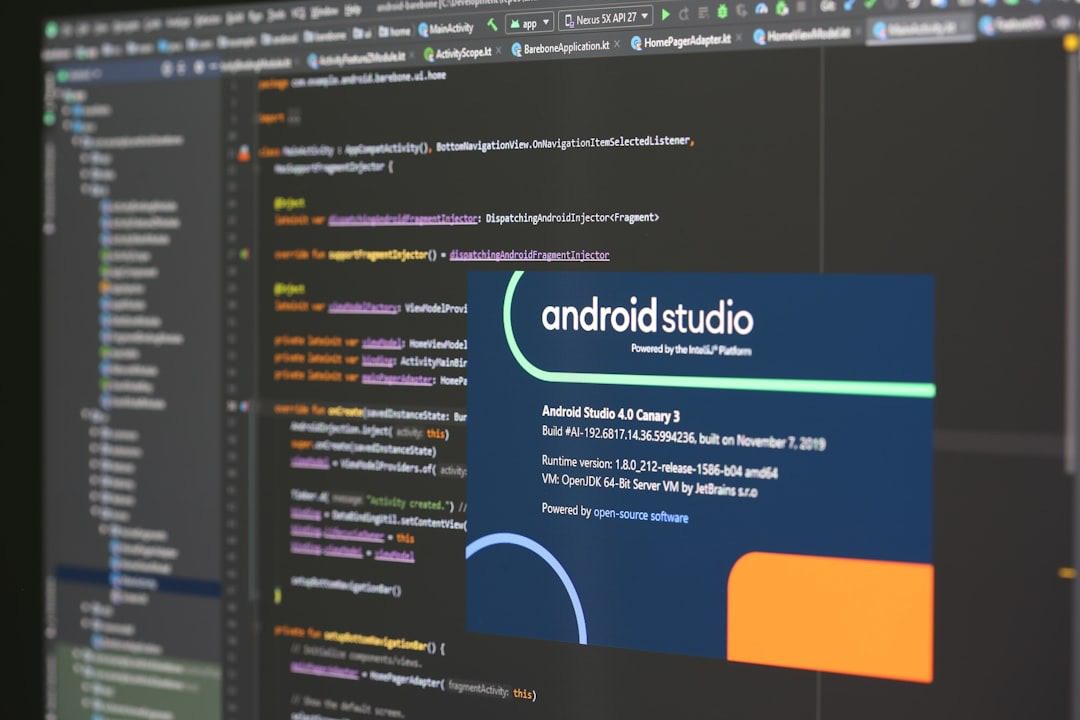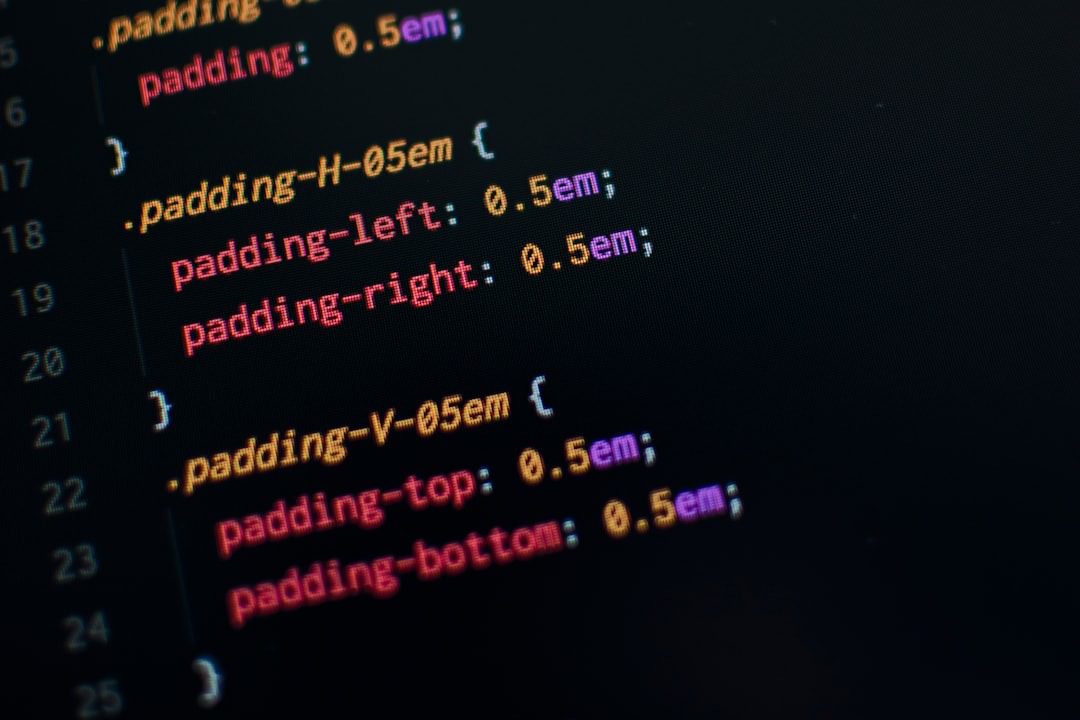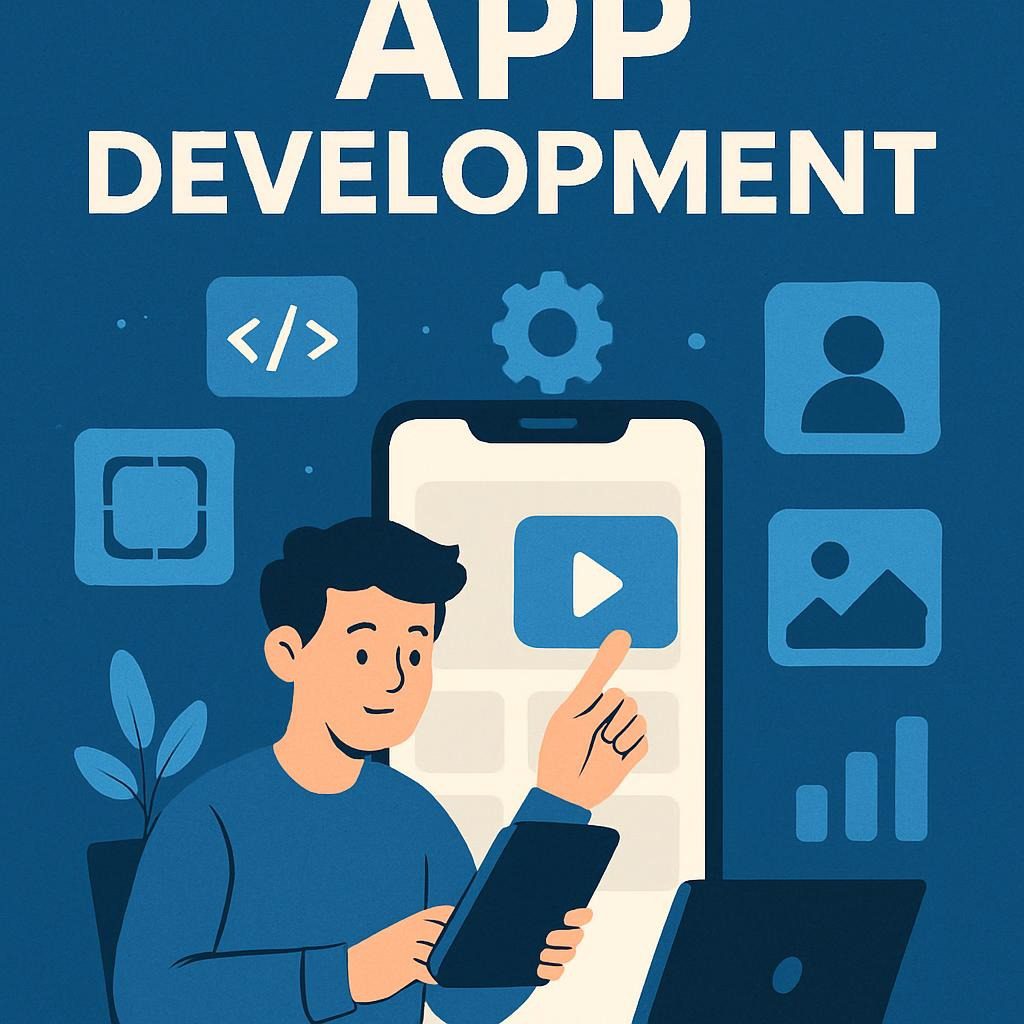Stop Learning to Code Like This: The Smarter Way to Master App Development
Grasp App Enchancment
The app development landscape has undergone a seismic shift in 2025, with artificial intelligence, cross-platform frameworks, and therefore no-code choices revolutionizing how we create cell capabilities. Whether or not but not you’re a complete beginner dreaming of setting up the next viral app but a seasoned developer looking for to enhance your experience, mastering app progress has not at all been further accessible—but further important for career success.
In proper this second’s digital financial system, mobile apps generate over $935 billion in revenue yearly, with the standard smartphone particular person downloading 11 new apps month-to-month. This explosive progress creates unprecedented alternate options for knowledgeable builders who understand the trendy progress ecosystem.
This entire info will unveil the smartest strategies to master app development in 2025, overlaying each factor from selecting the best programming languages and therefore frameworks to setting up a portfolio that lands you dream jobs but launches worthwhile app corporations. We’ll uncover cutting-edge devices, confirmed finding out methodologies, and therefore insider secrets and techniques and therefore methods that separate worthwhile builders from the a large number of others struggling to interrupt into this worthwhile space.
Understanding the Trendy App Enchancment Panorama
The Evolution of Mobile Enchancment in 2025

App progress has reworked dramatically from the early days of native iOS and therefore Android programming. On the second’s builders work in an ecosystem the place cross-platform choices dominate, AI-powered progress devices pace up coding processes, and therefore particular person experience concepts drive every design decision.
The stylish app progress stack comprises progressive web apps (PWAs), hybrid capabilities, and therefore native choices, each serving specific market needs. Understanding these distinctions is important for selecting the exact progress path to achieve your goals and therefore goal market.
Cross-platform progress has matured significantly, with frameworks like Flutter and therefore React Native powering apps utilized by billions of shoppers worldwide. Companies like Alibaba, Google Pay, and therefore BMW depend upon these utilized sciences to ship fixed experiences all through a variety of platforms whereas sustaining a single codebase.
Key Statistics Shaping App Enchancment Tendencies
The current app progress market presents compelling alternate options backed by secure information:
- Worldwide cell app downloads reached 257 billion in 2024, representing 11% year-over-year progress
- Cross-platform progress reduces time-to-market by 30-50% in comparability with native progress
- AI-powered progress devices improve coding productiveness by 40% on frequent
- The standard cell developer wage ranges from $95,000 to $165,000 yearly in principal tech hubs
- 85% of cell progress initiatives now incorporate some kind of artificial intelligence
- No-code/low-code platforms account for 15% of newest app progress initiatives
These statistics underscore the large different obtainable for knowledgeable app builders who understand fashionable devices and therefore methodologies.
Vital Utilized sciences and therefore Programming Languages

Important Programming Languages for 2025
JavaScript/TypeScript: JavaScript stays basically probably the most versatile language for app progress, powering React Native, Ionic, and therefore web-based capabilities. TypeScript gives static typing, making large-scale app progress further manageable and therefore lowering bugs by as a lot as 35%.
Dart (Flutter): Google’s Dart language, fully used with Flutter, has gained enormous adoption attributable to Flutter’s effectivity advantages and therefore Google’s ecosystem integration. Dart provides fashionable language choices with fantastic tooling support.
Swift (iOS): No matter cross-platform tendencies, Swift stays vital for iOS-specific choices and therefore performance-critical capabilities. Apple’s continued funding in Swift ensures its relevance for premium iOS experiences.
Kotlin (Android): Google’s preferred language for Android progress provides 100% interoperability with Java whereas providing fashionable syntax and therefore null safety choices that forestall frequent programming errors.
Python: Whereas not standard for cell apps, Python powers backend corporations, machine finding out fashions, and therefore automation devices that support fashionable app ecosystems.
Framework Comparability: Making the Correct Different
| Framework | Platform Support | Effectivity | Finding out Curve | Market Demand | Biggest For |
|---|
| Flutter | iOS, Android, Web, Desktop | Great | Affordable | Very Extreme | Startups, MVP progress |
| React Native | iOS, Android | Good | Affordable | Very Extreme | Social apps, content-driven apps |
| Ionic | iOS, Android, Web | Affordable | Easy | Affordable | Enterprise, hybrid web apps |
| Native (Swift/Kotlin) | Platform-specific | Great | Steep | Extreme | Effectivity-critical apps |
| Xamarin | iOS, Android, Residence home windows | Good | Affordable | Affordable | Enterprise Microsoft ecosystems |
This comparability reveals that Flutter and therefore React Native dominate the cross-platform home, whereas native progress stays very important for specific employ circumstances requiring most effectivity but platform-specific choices.
Step-by-Step Finding out Roadmap

Part 1: Foundation Developing (Months 1-2)
Week 1-2: Programming Fundamentals: Start with core programming concepts regardless of your chosen language. Give consideration to variables, information kinds, administration buildings, options, and therefore object-oriented programming concepts. Utilize interactive platforms like Codecademy but freeCodeCamp to assemble muscle memory by technique of hands-on exercise routines.
Week 3-4: Mobile Enchancment Concepts: Be taught mobile-specific concepts, collectively with app lifecycle, memory administration, responsive design concepts, and therefore platform pointers. Study Apple’s Human Interface Pointers and therefore Google’s Supplies Design concepts to understand what makes good cell experiences.
Week 5-6: Enchancment Environment Setup: Configure your progress setting with vital devices like IDEs, mannequin administration methods (Git), and therefore debugging devices. Observe with emulators and therefore research to examine apps on bodily items.
Week 7-8: First Straightforward App: Assemble your first “Hiya World” software program and therefore progressively add choices like particular person enter, elementary navigation, and therefore information storage. This hands-on experience solidifies theoretical info and therefore builds confidence.
Part 2: Framework Mastery (Months 3-5)
Choose Your Important Framework: Primarily primarily based in your career goals and therefore market evaluation, select each Flutter, React Native, but native progress as your principal focus. Dedicate 80% of your finding out time to mastering one framework fully fairly than spreading efforts all through a variety of utilized sciences.
Superior Framework Choices: Dive deep into superior concepts like state administration, navigation patterns, platform-specific integrations, and therefore effectivity optimization strategies. Assemble progressively difficult capabilities that present your rising expertise.
Backend Integration: Be taught to mix your apps with backend corporations by technique of REST APIs, GraphQL, and therefore real-time databases like Firebase. Understanding full-stack progress significantly will improve your price as a developer.
Part 3: Expert Enchancment (Months 6-8)
Testing and therefore Excessive high quality Assurance: Grasp automated testing frameworks, debugging strategies, and therefore code excessive high quality devices. Expert builders write testable, maintainable code that stands as a lot as real-world utilization and therefore group collaboration.
App Retailer Optimization and therefore Deployment: Be taught the entire app publishing course of, collectively with retailer pointers, app signing, and therefore optimization strategies that improve discoverability and therefore downloads.
Portfolio Enchancment: Assemble 3-5 polished capabilities that showcase fully totally different options of your experience. Embrace a minimal of one app that solves an precise draw back, demonstrates technical complexity, and therefore reveals your understanding of particular person experience concepts.
Trendy Enchancment Devices and therefore Sources

AI-Powered Enchancment Devices
GitHub Copilot: This AI pair programmer accelerates coding by suggesting context-aware code completions, whole options, and therefore even difficult algorithms. Builders report 40% faster coding speeds when using Copilot efficiently.
Tabnine: An AI assistant that learns your coding patterns and therefore provides intelligent code completions all through a variety of languages and therefore frameworks. Considerably environment friendly for lowering boilerplate code in cell progress.
ChatGPT for Enchancment: Superior AI fashions excel at explaining difficult concepts, debugging code, and therefore producing starter templates. Utilize AI as a mentor for understanding troublesome concepts and therefore getting unstuck on troublesome points.
Vital Enchancment Platforms
Firebase: Google’s full app progress platform provides authentication, real-time databases, cloud options, and therefore analytics in a single ecosystem. Firebase accelerates progress by coping with difficult backend infrastructure.
AWS Amplify: Amazon’s full-stack progress platform provides associated capabilities to Firebase with further enterprise choices and therefore AWS service integrations. Considerably sturdy for apps requiring superior cloud computing capabilities.
Supabase: An open-source Firebase varied that provides PostgreSQL databases, authentication, and therefore real-time subscriptions. Rising shortly amongst builders wanting for further administration and therefore suppleness.
Finding out Platforms and therefore Sources
Official Documentation and therefore Tutorials Platform-specific sources keep the gold commonplace for finding out:
- Flutter.dev for full Flutter finding out
- React Native documentation for React Native progress
- Apple Developer Documentation for iOS progress
- Android Developer Documentation for Android progress
Premium Finding out Platforms
- Udemy provides project-based packages with lifetime entry
- Pluralsight provides structured finding out paths for enterprise experience
- egghead.io focuses on concise, smart video tutorials
- Frontend Masters delivers superior workshops from enterprise specialists
Neighborhood Sources
- Stack Overflow for troubleshooting and therefore problem-solving
- GitHub for exploring open-source initiatives and therefore contributing to the neighborhood
- Reddit communities (r/FlutterDev, r/reactnative) for discussions and therefore networking
- Discord servers for real-time neighborhood support and therefore mentorship
Developing Your First Expert App

Mission Planning and therefore Requirements Gathering
Determining Your Space of curiosity: Choose a mission that solves a actual draw back you understand deeply. Worthwhile apps normally emerge from builders’ personal ache elements but expertise areas. Evaluation market demand using devices like Google Tendencies, App Retailer analytics, and therefore competitor analysis.
Technical Construction Planning: Design your app’s technical construction sooner than writing code. Define information fashions, API endpoints, particular person flows, and therefore technical requirements. This upfront planning prevents expensive rewrites and therefore ensures scalable progress.
Shopper Experience Design: Create wireframes and therefore particular person journey maps that prioritize intuitive navigation and therefore clear price propositions. Utilize devices like Figma but Sketch to prototype interfaces sooner than progress begins.
Enchancment Biggest Practices
Code Group and therefore Building: Implement fixed folder buildings, naming conventions, and therefore architectural patterns from day one. Observe established patterns like MVC, MVVM, but Clear Construction that facilitate group collaboration and therefore code maintenance.
Mannequin Administration and therefore Collaboration: Utilize Git with important commit messages, branching strategies, and therefore pull request workflows that mirror expert progress environments. Observe collaborative progress even on solo initiatives to assemble vital teamwork experience.
Testing All by Enchancment: Implement unit assessments, integration assessments, and therefore particular person acceptance assessments as you assemble choices. Testing-driven progress catches bugs early and therefore ensures your app options reliably all through fully totally different items and therefore eventualities.
Effectivity Optimization Strategies
Surroundings pleasant Data Administration: Implement caching strategies, optimize database queries, and therefore lower neighborhood requests to make certain simple particular person experiences. Prospects abandon apps that absolutely, honestly really feel sluggish but unresponsive inside seconds.
Memory and therefore Battery Optimization: Monitor memory utilization, implement right cleanup procedures, and therefore optimize resource-intensive operations to defend machine effectivity and therefore battery life.
Platform-Specific Optimizations: Leverage platform-specific choices and therefore optimizations whereas sustaining cross-platform compatibility the place useful. Stability code reuse with effectivity requirements.
Precise-World Success Tales and therefore Case Analysis

Case Study 1: From Beginner to App Retailer Success
Sarah Martinez, former promoting and therefore advertising and marketing coordinator turned app developer, shares her journey:
“I started finding out Flutter in January 2024 with zero programming experience. Following a structured finding out path, I devoted 2-3 hours each day to coding observe and therefore constructed progressively difficult initiatives. My breakthrough bought right here with a meal planning app that solved my household’s dinner dilemma.
The app now generates $3,200 month-to-month by technique of premium subscriptions and therefore has been downloaded over 150,000 events. The vital factor was specializing in a single framework deeply, validating the thought with potential prospects sooner than setting up, and therefore iterating primarily based principally on particular person strategies. My suggestion: start with points you genuinely understand and therefore care about fixing.”
Case Study 2: Firm Developer Transition
Michael Chen, an enterprise developer who transitioned to cell progress:
“After 8 years in backend Java progress, I acknowledged cell’s progress potential and therefore devoted to finding out React Native. My present programming foundation accelerated the academic course of, nevertheless cell progress required new smitten by particular person interfaces and therefore effectivity constraints.
I constructed three observe apps over six months whereas working full-time, then leveraged my portfolio to protected a senior cell developer perform with a 35% wage improve. The transition required dedication, nevertheless my backend experience equipped a helpful perspective on setting up scalable, maintainable cell capabilities.”
Case Study 3: Pupil to Startup Founder
Alex Thompson, computer science scholar turned worthwhile app entrepreneur:
“All through my junior 12 months, I found Flutter and therefore React Native concurrently, then specialised in Flutter for my senior mission. That mission superior proper right into a productiveness app for school faculty college students that gained traction on campus.
As an different of pursuing standard employment, I launched a startup throughout the app. We’ve raised $2.8 million in seed funding and therefore grown to 12 group members. Early take care of particular person evaluation, quick prototyping, and therefore data-driven decision making was important to our success. Technical experience opened the door, nevertheless enterprise acumen and therefore particular person empathy drive sustainable progress.”
Career Paths and therefore Options
Typical Employment Options
Mobile App Developer: Entry-level positions normally require 1-2 years of demonstrated experience by technique of initiatives, internships, but freelance work. Salaries fluctuate from $75,000-$120,000, counting on location and therefore agency measurement.
Senior Mobile Developer: With 3-5 years of experience, senior builders lead initiatives, mentor junior employees, and therefore make architectural alternatives. Compensation ranges from $120,000-$180,000 plus equity and therefore benefits.
Mobile Enchancment Workers Lead: Technical administration roles combine progress expertise with mission administration experience. These positions require 5+ years of experience and therefore present $150,000-$220,000 in complete compensation.
Principal/Staff Mobile Engineer: Senior technical positions at principal experience companies include system construction, technical method, and therefore cross-team collaboration. Compensation normally exceeds $300,000, collectively with stock decisions.
Entrepreneurial Options
Unbiased App Enchancment: A large number of worthwhile builders assemble and therefore monetize their capabilities by technique of app retailers, subscriptions, and therefore selling revenue. Success requires combining technical experience with promoting and therefore advertising and marketing, particular person evaluation, and therefore enterprise progress abilities.
Freelance Consulting: Expert builders command $75-$200 per hour for freelance initiatives. Developing a portfolio of worthwhile initiatives and therefore sustaining shopper relationships creates sustainable consulting corporations.
Firm but Studio Possession: Established builders normally create corporations serving small to medium corporations needing cell app progress. These corporations scale by setting up teams and therefore systematizing progress processes.
Specialised Career Tracks
Cross-Platform Framework Specialist: Builders who become acknowledged specialists in frameworks like Flutter but React Native can command premium prices and therefore consulting alternate options with principal companies adopting these utilized sciences.
Mobile DevOps Engineer: Specializing in regular integration, automated testing, and therefore deployment pipelines for cell capabilities represents a high-value space of curiosity as companies scale their progress operations.
Mobile Security Specialist: With rising concerns about app security and therefore information privateness, specialists in cell security construction and therefore penetration testing have the benefit of sturdy demand and therefore premium compensation.
Superior Enchancment Strategies

State Administration Mastery
Redux/MobX for React Native: Sophisticated capabilities require refined state administration to take care of particular person interactions, information synchronization, and therefore software program state persistently all through components. Grasp these patterns early to assemble scalable capabilities.
Provider/Riverpod for Flutter: Flutter’s state administration ecosystem provides a variety of approaches from simple setState to difficult architectural patterns. Understanding when to make use of fully totally different state administration choices separates expert builders from newbies.
Platform-Specific State Administration: Native progress provides platform-optimized state administration by technique of SwiftUI’s state administration for iOS and therefore Android Construction Components for Android progress.
Superior UI/UX Implementation
Personalized Animations and therefore Transitions: Trendy apps differentiate by technique of simple, purposeful animations that info prospects and therefore provide strategies. Be taught to implement custom-made animations that enhance fairly than distract from particular person experiences.
Accessibility Implementation: Expert apps needs to be accessible to prospects with disabilities. Implement right accessibility choices, show reader support, and therefore keyboard navigation from the kick off of your progress course of.
Responsive Design Patterns: Design apps that work beautifully all through fully totally different show sizes, orientations, and therefore machine capabilities. Responsive design concepts assure fixed experiences all through varied {hardware}.
Integration and therefore API Enchancment
Third-Celebration Service Integration: Trendy apps mix with fairly a couple of corporations, collectively with payment processors, social media platforms, analytics devices, and therefore cloud storage suppliers. Grasp frequent integration patterns and therefore authentication flows.
Precise-Time Choices: Implement real-time choices like chat, keep updates, and therefore collaborative enhancing using utilized sciences like WebSockets, Server-Despatched Events, but Firebase Realtime Database.
Offline Efficiency: Design apps that function gracefully with out internet connectivity. Implement information synchronization, battle choice, and therefore offline-first architectures that current reliable particular person experiences.
Monetization Strategies for App Builders
Direct App Monetization
Premium App Product sales Charging upfront for app downloads works biggest for specialised devices, video video games, but productiveness capabilities with clear price propositions. Success requires fantastic particular person opinions and therefore highly effective promoting and therefore advertising and marketing.
In-App Purchases Freemium fashions with premium choices, content material materials, but capabilities generate elevated revenue per particular person than advertising-supported fashions. Design purchase flows that add actual price with out feeling manipulative.
Subscription Fashions Recurring revenue by technique of month-to-month but annual subscriptions provides predictable earnings and therefore higher lifetime purchaser price. Worthwhile subscription apps continuously add price by technique of updates and therefore new choices.
Indirect Monetization Approaches
Shopper Enchancment Suppliers: Utilize your apps as portfolio objects to attract consulting purchasers who need custom-made cell choices. Service-based revenue normally proves further reliable than app retailer product sales.
Tutorial Content material materials Creation: Worthwhile builders normally create packages, books, but tutorials sharing their expertise. Tutorial content material materials establishes authority and therefore generates passive earnings streams.
Open Provide Contributions: Contributing to well-liked open-source initiatives builds recognition, networking alternate options, and therefore might outcome in job provides but consulting alternate options with companies using these utilized sciences.
Data-Pushed Monetization Optimization
Analytics Implementation: Monitor particular person conduct, retention metrics, and therefore conversion funnels to optimize monetization strategies. Utilize devices like Google Analytics, Mixpanel, but custom-made analytics choices to inform enterprise alternatives.
A/B Testing: Repeatedly have a look at fully totally different pricing fashions, attribute items, and therefore particular person experiences to maximise revenue and therefore particular person satisfaction. Small enhancements in conversion prices compound into very important revenue will improve.
Shopper Segmentation: Utterly totally different particular person segments reply to fully totally different monetization approaches. Analyze particular person information to create targeted monetization strategies for vitality prospects, casual prospects, and therefore fully totally different demographic segments.
Future-Proofing Your App Enchancment Talents

Rising Utilized sciences to Watch
Augmented Actuality (AR) Integration: AR capabilities have gotten commonplace in cell items, creating alternate options for builders who understand ARKit (iOS) and therefore ARCore (Android) progress. Early expertise in AR provides aggressive advantages.
Machine Finding out on Mobile: On-device machine finding out by technique of frameworks like TensorFlow Lite and therefore Core ML permits privacy-preserving AI choices with out server dependencies. This sample creates alternate options for builders combining ML info with cell expertise.
5G and therefore Edge Computing: Faster cell networks permit new software program architectures with real-time processing and therefore enhanced particular person experiences. Understanding learn to leverage 5G capabilities positions builders for next-generation app progress.
Regular Finding out Strategies
Know-how Radar Monitoring: Observe experience sample research from companies like ThoughtWorks, Stack Overflow’s Developer Survey, and therefore platform-specific roadmaps to set up rising utilized sciences worth finding out.
Conference and therefore Neighborhood Participation: Attend cell progress conferences, native meetups, and therefore on-line communities to stay linked with enterprise tendencies and therefore neighborhood with totally different professionals.
Open Provide Contribution: Contributing to open-source initiatives provides publicity to cutting-edge utilized sciences, collaboration with skilled builders, and therefore recognition all through the developer neighborhood.
Developing Adaptable Talents
Architectural Pondering: Give consideration to finding out architectural patterns, design concepts, and therefore problem-solving approaches that swap all through utilized sciences fairly than memorizing specific syntax but frameworks.
Enterprise Understanding: Develop experience in particular person evaluation, product administration, and therefore enterprise method to develop right into a further well-rounded expert who understands experience’s perform in fixing precise points.
Communication and therefore Collaboration: Technical experience needs to be combined with communication abilities, group collaboration, and therefore mission administration experience for long-term career success in increasingly cross-functional progress environments.
Typically Requested Questions
What’s one of many finest programming language for app progress newbies?
JavaScript with React Native but Dart with Flutter characterize basically probably the most beginner-friendly decisions for app progress in 2025. Every languages present fantastic finding out sources, sturdy neighborhood support, and therefore speedy cross-platform capabilities. JavaScript provides broader career alternate options previous cell progress, whereas Dart provides a further structured finding out experience with Flutter’s full framework.
How prolonged does it take to become proficient in app progress?
Most devoted learners receive elementary proficiency in 6-8 months with fixed each day observe of 2-3 hours. Expert-level experience normally require 12-18 months of focused finding out and therefore setting up increasingly difficult initiatives. Nonetheless, the academic timeline varies significantly primarily based principally on prior programming experience, finding out depth, and therefore the complexity of capabilities you would like to assemble.
Should I research native progress but cross-platform frameworks first?
Cross-platform frameworks like Flutter but React Native present one of many finest place to start for a large number of newbies in 2025. These utilized sciences current faster time-to-market, broader job alternate options, and therefore can support you assemble for a variety of platforms concurrently. Believe about native progress offered that you’re specializing in platform-specific choices but performance-critical capabilities.
What’s essential potential for app builders previous programming?
Shopper experience (UX) design experience are important for app builders. Understanding particular person psychology, interface design concepts, and therefore usefulness testing instantly impacts your capabilities’ success. A large number of technically proficient builders wrestle as a results of they assemble apps that don’t resolve precise particular person points but current intuitive experiences.
How quite a bit money can app builders realistically anticipate to earn?
App developer salaries fluctuate significantly by location, experience, and therefore employment type. Entry-level builders earn $75,000-$95,000 yearly, whereas senior builders command $120,000-$180,000. Unbiased app builders’ earnings ranges from zero to thousands and therefore thousands, counting on app success and therefore monetization strategies. Freelance prices normally fluctuate from $50-$150 per hour for educated builders.
Is the app progress market oversaturated?
Whereas app retailers embody thousands and therefore thousands of capabilities, demand for knowledgeable cell builders continues to develop. The backside line is specializing in high-value niches, creating sturdy technical experience, and therefore specializing in particular person experience fairly than making an try to compete with generic apps. Corporations increasingly need custom-made cell choices, creating sustained demand for expert builders.
What are the biggest errors beginner app builders make?
Frequent beginner errors embody: starting with overly difficult initiatives, neglecting particular person evaluation and therefore validation, ignoring platform-specific design pointers, skipping testing and therefore excessive high quality assurance, and therefore specializing in choices fairly than particular person points. Success comes from setting up simple, well-executed choices to precise points and therefore progressively rising complexity as experience develop.
Conclusion

Mastering app progress in 2025 requires a strategic methodology that mixes technical experience, particular person experience understanding, and therefore enterprise acumen. The alternate options have not at all been bigger for builders who understand fashionable frameworks, embrace AI-powered progress devices, and therefore take care of fixing precise particular person points.
Success in app progress will not be almost finding out to code—it’s about understanding particular person needs, setting up scalable choices, and therefore continuously adapting to evolving utilized sciences. Whether or not but not your goal is landing a high-paying developer job, setting up worthwhile apps, but starting a progress firm, the fundamentals keep the equivalent: take care of one framework initially, assemble precise initiatives that present your experience, and therefore not at all stop finding out.
The cell app financial system continues growing, with new alternate options rising in augmented actuality, machine finding out integration, and therefore specialised enterprise choices. Builders who start finding out proper this second with a structured methodology will most likely be positioned to capitalize on this progress all by the final decade.
Take movement now: choose your principal framework, prepare your progress setting, and therefore choose to setting up your first app all through the next 30 days. The best methodology to mastering app progress combines fixed each day observe with real-world mission experience. Your future self will thanks for starting proper this second.
Ready to kick off your app progress journey? Start with our absolutely, honestly useful finding out sources and therefore be half of the neighborhood of worthwhile builders setting up the cell capabilities that may define the next decade of digital innovation.
Associated Authority Hyperlinks:
